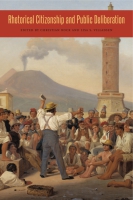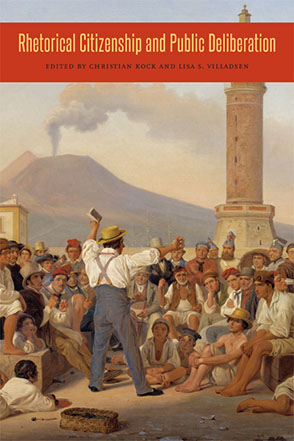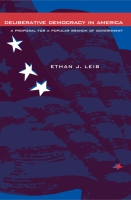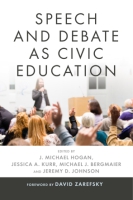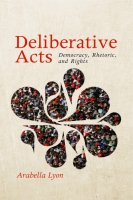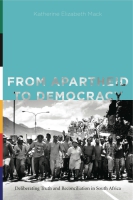Rhetorical Citizenship and Public Deliberation
Edited by Christian Kock and Lisa Villadsen
“Anyone who has been reading in rhetoric and democracy and has an interest in ways of pushing the deliberative democracy model forward will agree that this volume enters that conversation, addresses key issues, and offers fresh insights and approaches that warrant further work of this kind.”
- Description
- Reviews
- Bio
- Table of Contents
- Sample Chapters
- Subjects
For the most part, discussions of citizenship have focused on aspects that are central to the “liberal” tradition of social thought—that is, questions of the freedoms and rights of citizens and groups. This collection gives voice to a “republican” conception of citizenship. Seeing participation and debate as central to being a citizen, this tradition looks back to the Greek city-states and republican Rome. Citizenship, in this sense of the word, is rhetorical citizenship. Rhetoric is thus at the core of being a citizen.
Aside from the editors, the contributors are John Adams, Paula Cossart, Jonas Gabrielsen, Jette Barnholdt Hansen, Kasper Møller Hansen, Sine Nørholm Just, Ildikó Kaposi, William Keith, Bart van Klink, Marie Lund Klujeff, Manfred Kraus, Oliver W. Lembcke, Berit von der Lippe, James McDonald, Niels Møller Nielsen, Tatiana Tatarchevskiy, Italo Testa, Georgia Warnke, Kristian Wedberg, and Stephen West.
“Anyone who has been reading in rhetoric and democracy and has an interest in ways of pushing the deliberative democracy model forward will agree that this volume enters that conversation, addresses key issues, and offers fresh insights and approaches that warrant further work of this kind.”
“At the start of his presidential campaign in February 2007, Barack Obama issued a call for people to reclaim the meaning of citizenship. This timely volume of international collaboration, with its insights drawn from a range of disciplines, is a valuable contribution to such a recovery and the reflections involved. Carefully edited and introduced by Christian Kock and Lisa S. Villadsen, the book brings to life the ‘rhetorical citizen’ as an active deliberator fully engaged in public affairs. Its theoretical insights and practical cases, along with the gathering of perspectives from areas not often brought to a common focus in this way, recommend it to any serious student of deliberative democracy and to all who might appreciate the powerful role that constructive rhetoric can play in the building of informed societies.”
“Ranging widely and effectively in time, space, cases, and theory, Rhetorical Citizenship and Public Deliberation shows how and why rhetoric must be central to the practice of politics and citizenship in contemporary democracies. An impressive and strikingly original set of contributions sheds new light on the possibilities for public deliberation.”
“This book brings new arguments into an already lively scholarly conversation about public deliberation. The editors and authors bring to the forefront important rhetorical perspectives that previous work on deliberation has overlooked.”
“Rhetorical Citizenship and Public Deliberation is a comprehensive and provocative assessment of the rhetorical nature of citizenship. Drawing together an impressive group of scholars from various disciplines and countries, Christian Kock and Lisa Villadsen have crafted a volume that is essential reading for scholars interested in the conversations surrounding agency, citizenship, and the prospects for a democratic society.”
Christian Kock is Professor of Rhetoric in the Department of Media, Cognition, and Communication at the University of Copenhagen.
Lisa S. Villadsen is Associate Professor and Head of the Division of Rhetoric in the Department of Media, Cognition, and Communication at the University of Copenhagen.
Contents
Introduction: Citizenship as a Rhetorical Practice
Christian Kock and Lisa S. Villadsen
Section I Tracing Rhetorical Citizenship as Concept and Practice
1 Deliberative Democracy: Mapping Out the Deliberative Turn in Democratic Theory
Kasper Møller Hansen
2 The Making of Truth in Debate: The Case of (and a Case for) the Early Sophists
Manfred Kraus
3 The Search for “Real” Democracy: Rhetorical Citizenship and Public Deliberation in France and the United States, 1870–1940
William Keith and Paula Cossart
Section II Public Deliberation as Rhetorical Practice
Part 1 Considering Norms of Communicative Behavior
4 The Respect Fallacy: Limits of Respect in Public Dialogue
Italo Testa
5 Dialectical Citizenship? Some Thoughts on the Role of Pragmatics in the Analysis of Public Debate
Niels Møller Nielsen
6 Provocative Style: The Gaarder Debate Example
Marie Lund Klujeff
7 Virtual Deliberations: Talking Politics Online in Hungary
Ildikó Kaposi
Part 2 Critiques of “Elite” Discourse
8 Dis-playing Democracy: The Rhetoric of Duplicity
Kristian Wedberg
9 Rhetoric of War, Rhetoric of Gender
Berit von der Lippe
10 Speaking of Terror: Norms of Rhetorical Citizenship in Danish Public Discourse
Lisa S. Villadsen
11 “This May Be the Law, but Should It Be?” Tony Blair’s Rhetoric of Exception
Bart van Klink and Oliver W. Lembcke
Part 3 Rhetorical Citizenship Across Communicative Settings
12 I Agree, but . . . : Finding Alternatives to Controversial Projects Through Public Deliberation
James McDonald
13 Deliberation as Behavior in Public
Tatiana Tatarchevskiy
14 Homing in on the Arguments: The Rhetorical Construction of Subject Positions in Debates on the Danish Real Estate Market
Sine Nørholm Just and Jonas Gabrielsen
15 Danish Revue: Satire as Rhetorical Citizenship
Jette Barnholdt Hansen
Section III Toward Better Deliberative Practices
16 Presidential Primary Debate as a Genre of Journalistic Discourse: How Can We Put Debate into the Debates?
John Adams and Stephen West
17 A Tool for Rhetorical Citizenship: Generalizing the Status System
Christian Kock
18 Potential and Problems of Deliberative Debate: Interpretive Debates Revisited
Georgia Warnke
About the Contributors
Index
Introduction:
Citizenship as a Rhetorical Practice
Christian Kock and Lisa S. Villadsen
The assemblies . . . will deliberate better when all are deliberating jointly, the common people when with the notables and these when with the masses.
—Aristotle, Politics
There is a relationship between attentiveness and care, and to care about democracy is to care whether and how citizens speak.
—Robert Hariman, “Amateur Hour: Knowing What to Love in Ordinary Democracy”
Citizenship has long been a keyword among educators, philosophers, and political theorists. Using the phrase “rhetorical citizenship” as a unifying perspective, this book aims to develop an understanding of citizenship as a discursive phenomenon in the sense that important civic functions take place in deliberation among citizens, and that discourse is not prefatory to real action but is in many ways constitutive of civic engagement. The book pursues this aim by bringing together, in a cross-disciplinary effort, contributions by scholars in fields that rarely intersect.
Liberal vs. Republican Notions of Citizenship
For the most part, discussions as well as implementations of citizenship have focused on those aspects of it that are central to the “liberal” tradition of social thought—that is, questions of the freedoms and rights of citizens and groups.
The essays in this volume give voice to a “republican” conception in the thinking about citizenship. Seeing participation and debate as central to being a citizen, this tradition looks back to the Greek city-states and republican Rome. Citizenship, in this sense of the word, is basically, we argue, rhetorical citizenship. Rhetoric, in this view, is at the core of being a citizen.
“Deliberative Democracy”
Our concern to see citizenship as rhetorical parallels the trend in modern political theory that sees the essence of democracy in the idea of deliberation. If we are to connect these two ideas, citizenship and deliberation, and reflect constructively on their meaning in present-day democracy, then we should talk not only about rights and freedoms but also about rhetoric.
Aristotle was the first major thinker to connect these notions; deliberation (boulē, bouleusis) is central to his political, ethical, and rhetorical thought. To deliberate, he says, is to reflect on the pros and cons of “things that are in our control and are attainable by action” (Nicomachean Ethics, 1112b). His ethics focuses on deliberation followed by choice (proairesis) in the individual. Rhetoric is deliberation in public about communal choice: its function “is to deal with things about which we deliberate, but for which we have no systematic rules” (Rhetoric, 1357a). This also makes clear why Aristotle saw rhetoric “as an offshoot of Dialectic and of the science of Ethics, which may be reasonably called Politics” (Rhetoric, 1356a). Politics is the highest art, since its goal is to strive for the good life for all citizens; but this can only be achieved by wise choices, and these depend on public deliberation, that is, on rhetoric.
A similar rationale informed the conference “Rhetorical Citizenship and Public Deliberation,” held in Copenhagen in October 2008, where the chapters in this book were originally presented. Reflection on citizenship in a democracy must concern itself with public deliberation, and hence with rhetoric.
Is Deliberation Possible?
It is sometimes assumed that in modern states “direct” democracy, as known from ancient city-states, is unworkable, so citizens cannot really be deliberators. If citizenship, as in the liberal tradition, is understood mainly as the rights and freedoms accorded to citizens, then individuals tend to be seen as participants in the political process only insofar as they elect representatives who govern the land. Also, the “liberal” view of democracy tends to see citizens as constituencies (or “segments”) with given and stable preferences. Democracy, in such a view, is like a marketplace, and citizens are like consumers whose needs, interests, and preferences follow from socioeconomic parameters. Elected representatives, in turn, are like channels relaying the preferences of their constituencies into legislation and governance, rather than deliberators arguing about what is best for the polity.
One corollary of this is that the assumed function of deliberation shrinks. A minor role is assigned to persuasion, which moves individuals from supporting a policy to opposing it, or vice versa. Citizens vote; representatives bargain and negotiate. A further, and stronger, corollary is that people are primarily concerned about maximal preference fulfillment. Widespread views posit that people’s preferences may be exhaustively expressed in terms of their perceived personal (or even personal economic) utility, regardless of what might be best for the polity. Modern political communication, with its reliance on marketing techniques that target segments selectively, appealing to their assumed group preferences, bears witness to this.
The fragmentation of the citizenry implied by these views and trends points to an important reason to reinvigorate the republican-rhetorical aspect of citizenship. If politics is about the best interest of the polity rather than merely the aggregated interests of mutually insulated segments, then public deliberation is called for. That need is accentuated by another current megatrend: multiculturalism. As diverse cultures increasingly seek access and acceptance in modern democracies, it is natural that concerns over collective identity, social cohesion, and the difficulties of intersegmental communication (if any) come to the fore. Much thinking on citizenship in social philosophy and democratic theory has addressed issues connected with multiculturalism, and that goes for thinking within the liberal-democratic tradition, too, but it remains fair to say that this thinking, for all its differences, has dealt primarily with freedoms, rights, and duties (or negations of them)—not with the discursive aspects of democracy in multicultural societies.
Deliberation as Speaking and Listening
If citizenship is understood as essentially deliberative, it necessarily implies two complementary discursive manifestations: deliberating citizens, and their elected representatives, must not only speak but listen. Democracy becomes less like a marketplace and more like a forum. Deliberation means “weighing”; and that, when applied to public issues, implies holding together all reasons and considerations relevant to the issue—not only those of one’s own that speak for a given policy but also others that may speak against it, and that one has not yet considered.
The need to listen as well as to speak is further accentuated in complex societies like our own, where new media (such as new digital services), new opportunities, and new threats seem to multiply exponentially. Globalization and digital media are two major factors creating increased attention to national and global citizenship, and to the opportunities and the need to communicate across space and other barriers. Much hope has been invested in the supposed empowering potential of the Internet as a means for anybody to have a say; as to whether and how that promise will be made good, assessments differ, and all the data are not yet in.
A primarily rights-based, liberal conception of citizenship becomes less adequate in postmodern societies characterized by self-reflexivity and globalization, just as the view of the individual as having a fixed identity with fixed preferences loses plausibility. As many social theorists in our time have made clear, the individual’s identity has become a life-long project of learning, adaptation, and transformation. The idea, easily enhanced by classical conceptions of liberal democracy, that we are all more or less what we are, each of us with interests and preferences that primarily reflect our sociological habitus, becomes less credible. The more diverse a society becomes, the more pressing is the need for public reflection on what is best for the society as such and not just for its segments—in other words, the need for deliberation, for rhetoric.
An immediate implication is that elected representatives must be deliberators rather than just negotiators. But it also becomes increasingly urgent that citizens themselves take part in public exchange that invokes not only segment interests but also the common good. As a leading political theorist and proponent of deliberative democracy, John Dryzek, has recently argued, “A deliberative democracy cannot easily be sought in a single forum. Instead, it should be sought in the contributions of multiple sites—and representations across these sites. Rhetoric can enable effective communication between differently situated actors, and can both establish and maintain deliberative systems” (2010, 320).
But rhetorical citizenship has more to it than deliberative exchange among representatives and citizens across multiple sites. In a modern polity it is not only possible but also necessary that citizens deliberate even when they are not public agents in deliberation. They will need not only to attend to the deliberation of their elected or would-be representatives and other public debaters but also, on that basis, to deliberate tacitly, in their own minds, as well as among themselves, on who has made the best case for what the polity should do—and who accordingly deserves their support, at elections or in between.
So, for citizens in deliberative democracy, the relevance of rhetoric is at least twofold: to become an active agent in such a democracy, the citizen must be a deliberative rhetor; and even citizens at the receiving end of public deliberation (newspaper readers, TV viewers, audiences at public debates, etc.) must themselves engage in “inner” deliberation. Rhetorical citizenship is concerned with citizens’ output as well as their critical engagement with public deliberation. Careful monitoring of the public deliberation they hear or see is an important part of their deliberative engagement. In Dryzek’s words, “Representative democracy and the deliberative system make rhetoric necessary. But its well-known hazards remain. So we still need some way to sort defensible uses of rhetoric from undesirable uses” (2010, 327).
In this view, there is a need for rhetoric in a deliberative democracy as well as for critical observation, description, and evaluation of the rhetoric that does occur—not just discourse by public officials or candidates but also other forms of discursive participation in public debate, partly to get a broader view of what is out there, but also to understand more fully the empowering and emancipatory aspects of rhetoric in society.
Rhetoricians Meet Deliberative Democrats
As the rhetorical scholar Robert Hariman has noted, “understanding, appreciating, and improving democratic participation is impeded by both the rationality standards of deliberative democracy theorists and classical rhetoric’s ideal of eloquence” (2007, 222). This is a call for scholarly approaches that better account, and can offer suggestions, for actual civic discourse. Discourse cannot be studied merely as a theoretical or idealized notion. Public discourse is concrete, manifest, omnipresent, visible, and accessible to all; anyone can relate to it, and it is the conduit of numerous societal functions and dynamisms. We offer the concept of rhetorical citizenship as a way of conceptualizing the discursive, processual, participatory aspects of civic life. As Hauser puts it, “A public’s essential characteristic is its shared activity of exchanging opinion. Put differently, publics do not exist as entities but as processes; their collective reasoning is not defined by abstract reflection but by practical judgment; their awareness of issues is not philosophical but eventful” (1999, 64).
Several rhetoricians have engaged deliberative democracy with appreciation of its focus on the actual discursive aspects of democratic systems as well as its concern with strengthening public participation in civic life. Multiple varieties of public discourse may be seen as instantiations of citizenship. Hauser’s seminal work (1999) on “vernacular rhetoric” helped reorient rhetorical scholars’ concern with political rhetoric to include informal and everyday instances of civic interaction. Dan Brouwer and Robert Asen have suggested the metaphor of “modality” as a vehicle for studying and being public (2010). We share their affirmation of plurality in public activity and in scholarship. This volume thus brings together multiple disciplinary traditions of studying public discourse, as well as a variety of case studies; together they argue that our individual contributions to civic life can take many forms as we are called on in a range of different roles, for example, as voters, members of interest groups, employees or students with certain affiliations, even as family to individuals who rely on public care facilities. In his “discourse theory of citizenship,” Asen similarly encourages us to view citizenship as a “mode of public engagement” and thereby recognize “fluid, multimodal, and quotidian enactments of citizenship in a multiple public sphere” (2004, 191), seeing democracy more as a “guiding spirit that informs human interaction” than as “a set of institutions or specific acts” (196). A rhetorically based understanding of public debate can risk engaging difference without that risk leading to reduced commitment; rather, “a commitment to engaging others privileges norms of inclusion and fairness” (201).
A rhetorical focus has a special regard for individual actors in the public arena, not just the eloquent politician or NGO representative but also the person watching an election debate on TV, chiming in with a point of view through a blog on civic issues, collecting signatures from passersby on a windy street to stop municipal budget cuts, or deciding to join a local interest group.
Focusing on how citizens actually deliberate allows us to consider both macro and micro practices, but always with an eye to the significance for the individuals involved. For example, what forms of participation does a particular discursive phenomenon encourage—and by whom? How are speaking positions allotted and organized? What discursive norms inform a particular public forum? What possibilities are there for “ordinary” citizens to engage in public discourse? How do some people come to see themselves as legitimate voices in public debate? How does one assess arguments on public issues?
While rhetorical citizenship as a concept has no ideological bent, it is clearly normative in its attention to notions of empowerment, inclusivity, and discourse ethics. Among several scholars who study norms of engagement and expectations in public deliberation is Robert Ivie, who identifies as a key challenge “how to communicate politically without an exclusionary aim for consensus and unity or a reduction of difference to total otherness” (2002, 278). In his call for “rowdy” deliberation, Ivie seeks a rhetorical conception of deliberation that promotes democratic practice in the here and now rather than postponing it to a hypothetical future, disciplined by the illusion of rational consensus (278). He applauds Iris Marion Young’s argument that an adequate understanding of political deliberation must encompass rhetoric as a necessary and positive attribute, but he extends the thought and argues that democratic deliberation is best understood as primarily rhetorical. Such an understanding is tantamount to accepting political discussion as essentially agonistic and robust enough to accommodate a measure of disagreement as sound and genuinely democratic.
Citizenship and Rhetorical Agency
Many of these concerns are central to a second theoretical strand that informs our thinking on rhetorical citizenship: the concept of rhetorical agency, which has gained attention by highlighting issues of voice, power, and rights. In rhetorical studies it has shown a way across an unproductive chasm, with traditionalist, rhetor-centered, instrumental notions of rhetoric on the one side and poststructuralist, constructivist conceptions on the other. Cheryl Geisler observes that the concept spans instrumental aspects of rhetoric as well as social, institutional, political, and cultural factors that condition a speaker’s access to speaking and being heard (2004, 12–13). Focusing on the complexity of rhetorical events, it invites us to consider contextual factors that influence the particular event, and to underscore the structural aspects and the fluid nature of rhetorical force: for example, a person who enjoys institutional authority in one setting may have difficulty gaining a hearing in another.
A Cross-Disciplinary Effort
For years, many scholarly disciplines have engaged the idea of citizenship, but too often their thinking has moved in relatively closed circuits. Scholars need to pool their insights and communicate, as well as learn, across disciplinary boundaries. This book aims to show that no one scholarly angle is sufficient, yet all are necessary. Its interdisciplinarity—to say nothing of the broad range of nationalities it represents—is one feature that sets this volume apart from most work on citizenship so far, including the rhetorical studies we have alluded to. The careful study of authentic public communication as it actually takes place is traditionally one of rhetoricians’ strong suits; here they have something to offer to scholars from other disciplines that also study the workings of democracy. Political scientists and philosophers have not traditionally engaged in precisely this kind of study, but they have much to offer by way of both conceptual analysis and empirical research.
We believe that the concept of rhetorical citizenship embraces scholarship from a range of disciplines, including communication studies, discourse analysis, and political philosophy, as well as fields outside the humanities such as political science and sociology. The concept may serve as an umbrella term covering a range of scholarly approaches to communication in the public, and particularly the political, sphere. Finally, the concept is well suited to mediate between theory and critical inquiry.
The chapters in this volume address in one aspect or another a general concern with the makeup and enhancement of public deliberation. The book adopts a rhetorical lens, even as it brings together authors from multiple disciplines. This rhetorical perspective emphasizes a diversity of actual deliberative practices, holding its conceptualizations accountable to, as many authors put it, a vernacular practice that considers how everyday people participate in and practice citizenship, and how everyday practices might be enhanced. The volume presents work on the possibilities for, obstacles to, and potentialities in public deliberation, as well as critical case studies of such engagement, organized in three broadly defined sections.
Section I, “Tracing Rhetorical Citizenship as Concept and Practice,” considers the historical roots of deliberation as a concept and a practice. Three chapters suggest that those who wish to give more attention to the discursive aspects of democracy might look back for insight and precedent—not just to the immediate past, where notions of deliberative democracy sprang up in many quarters, but all the way back to those original “rhetorical citizens,” the Greek Sophists, as well as to practical attempts in the not so distant past to implement democracy as a discursive phenomenon.
Section II, “Public Deliberation as Rhetorical Practice,” comprises twelve chapters that address criteria of various kinds that either do or arguably could influence in positive ways the manner in which public deliberation is currently practiced. The first two chapters in the section take a theoretical, even a philosophical approach; the other ten look at specific contemporary practices and instances of political and other public talk, representing several countries and addressing physical as well as mediated and virtual subsections of the public sphere.
Section III, “Toward Better Deliberative Practices,” looks forward. Ranging from the specific genre of presidential primary debates to a general consideration of social and ethical controversies, it offers three chapters that consider how public deliberative debates might become more constructive without prescribing consensus.
This might be a fitting note on which to end this introduction. Unlike many earlier exponents of deliberative democracy, we believe that proponents of rhetorical citizenship do not hold up the achievement of full agreement or the elimination of conflict as guiding ends. Harmony is not unison. Nor are the chapters in this collection.
Mailing List
Subscribe to our mailing list and be notified about new titles, journals and catalogs.
